IN CRISIS
JUNTA FOR PROGRESSIVE ACTION
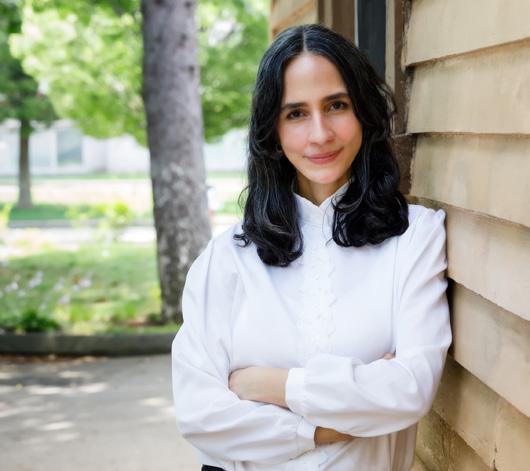
The pandemic has had disproportionate and cumulative downstream impacts on BILPOC (Black, Indigenous, Latinx, People of Color) communities. This era brought about a burgeoning eviction and mental health crisis all while climate change disasters continue to force families stateside to Greater New Haven. To address the multi-dimensional challenges affecting predominantly Latinx communities, we must be prepared to thrive in rapidly evolving environments and reinvent ourselves to meet changing needs. We redesigned our approach to offer telesocial services and strengthen our outreach and capacity. We’ve embraced these challenges as learning opportunities to meet people where they are.
The last three years have been a time of great introspection and creativity. Centering cultural placemaking is critical now more than ever. We co-designed cultural community celebrations that provided essential public health and social services to promote community cohesion. Thousands of community members joined us in celebration at Junta’s pop-up events as they jammed to Latin trap, salsa or bomba music and embraced the beauty of nuestra cultura.
For over 50 years, we’ve supported communities in crisis. As you will see in the forthcoming pages, our team is small but has a long-lasting impact. Thanks to the support of our funders, donors and community partners, we’ve been able to offer resources that strengthen household stability and provide community uplift. I could not be prouder of our achievements over the last three years, and look forward to many more years of collaboration and social innovation to collectively show up for our communities with intention and care.
2020-22 IMPACT REPORT JUNTA FOR PROGRESSIVE ACTION
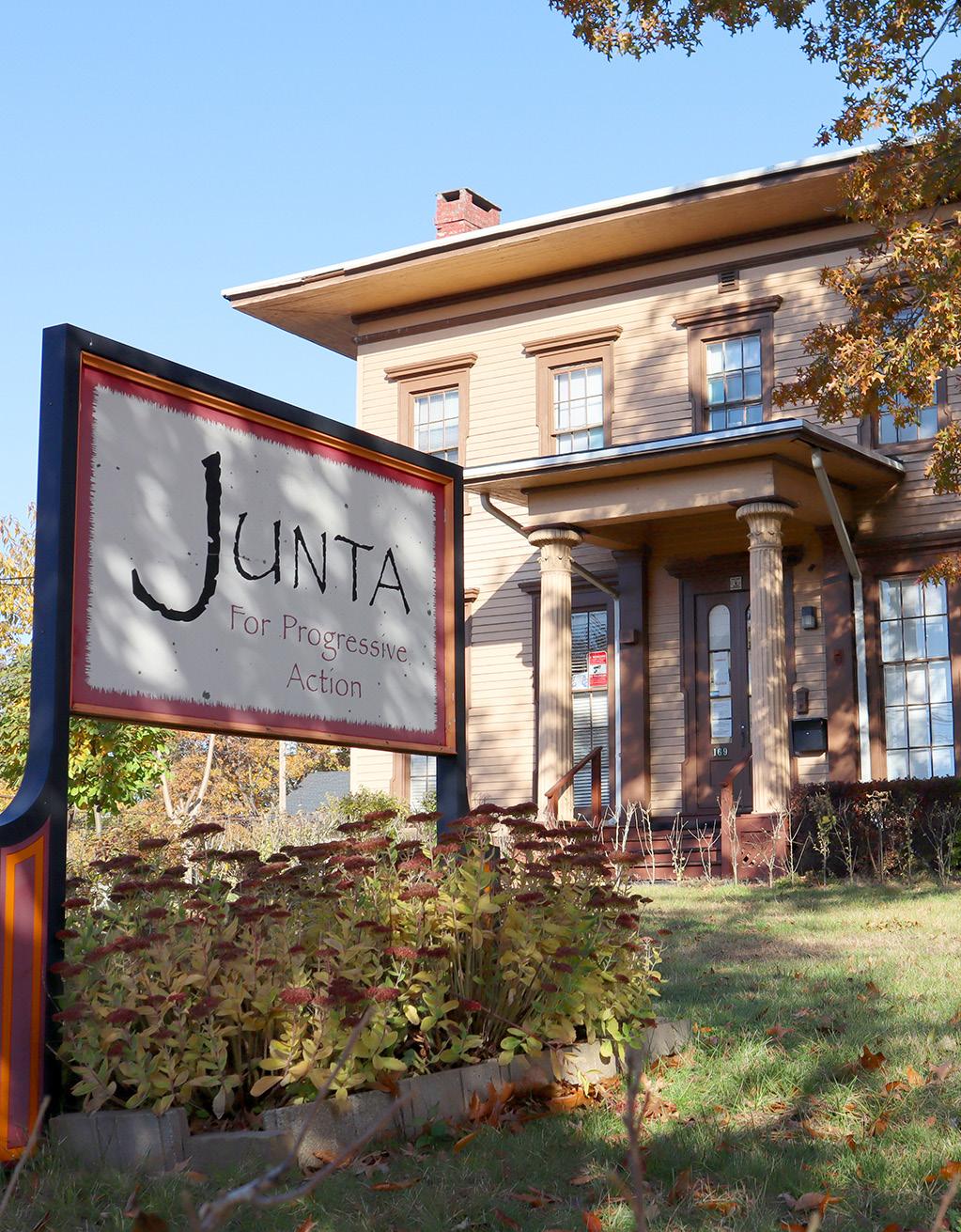
Our Mission & History
Founded in 1969, Junta for Progressive Action is the oldest Latinx, community-based non-profit organization in New Haven, Connecticut. We offer no-cost social services, financial support, referrals, and informational sessions to serve approximately 2,000 unique households, or over 5,000 community members, annually. Our mission is to collaborate with Latinx and immigrant communities in the Greater New Haven area to improve the social, economic, and civic environment for all.
For over 50 years, Junta has helped respond to the systemic challenges permeating the Latinx community. The cumulative burden our participants experience from all the prejudicial -isms and -phobias embedded in our society and history continues to persist. The legacies of redlining, environmental racism, and divestment are a few examples of what our community members have endured. Our work aims to reinforce existing social safety nets by connecting disadvantaged individuals and families to vital resources. Junta’s role as a resource hub for the community helps mitigate the conditions that enable poverty and social exclusion. And by supporting our participants in navigating predominantly English-speaking, complex bureaucratic systems, our crisis management team serves as an advocate for families in need.
Junta rallies behind these three objectives–community advocacy, crisis services, and being a resource hub–to support our efforts in providing bilingual, culturally-relevant programs and services.
The Three Pillars of Junta
Crisis Services
Throughout the pandemic, Junta has recognized the need to redefine our case management work as crisis services, reflecting the dire need in our community and the severity of the cases we manage. After March 2020, our work increased in stakes and urgency overnight because of Covid-19 and continues with that urgency today. Our participants, especially those who recently migrated, face homelessness, hunger, unemployment, health problems, and structural debt, to name a few. Our crisis services serve as a bridge to reduce barriers to accessing essential services.
Community Advocacy
Bureaucracy is a porous system, and because of the multiple crises our participants face, they cannot fall through the cracks. Our bilingual capabilities ensure that English proficiency is not a barrier to accessing or applying for services. Bilingual services imbued within a culturally relevant approach assures that participants are well-informed about the benefits they are entitled to. Junta also believes in fostering agency through educational programs to reinforce participants’ self-determination. From English language classes, youth programs, to housing rights workshops —we understand that strengthening self-reliance in our community means decreasing barriers in accessing accurate and culturally relevant information.
Resource Hub
Resource provision assumes two forms in our work: material resources and information. The former describes physical, tangible aid, such as our diaper distribution and direct cash aid programs. Access to information is critical in the Covid era. Junta collaborates with other community-based organizations and government agencies to provide contact information and referrals for various specialized social services found in New Haven. We also inform participants of aid and assistance programs they qualify for, which, in the case of undocumented individuals, is especially critical. As trusted messengers for the communities we serve, our social services team ensures that information is clear and accessible. Our aim is to dispel myths and clarify facts on various topics that include health literacy, bureaucratic and legal processes.
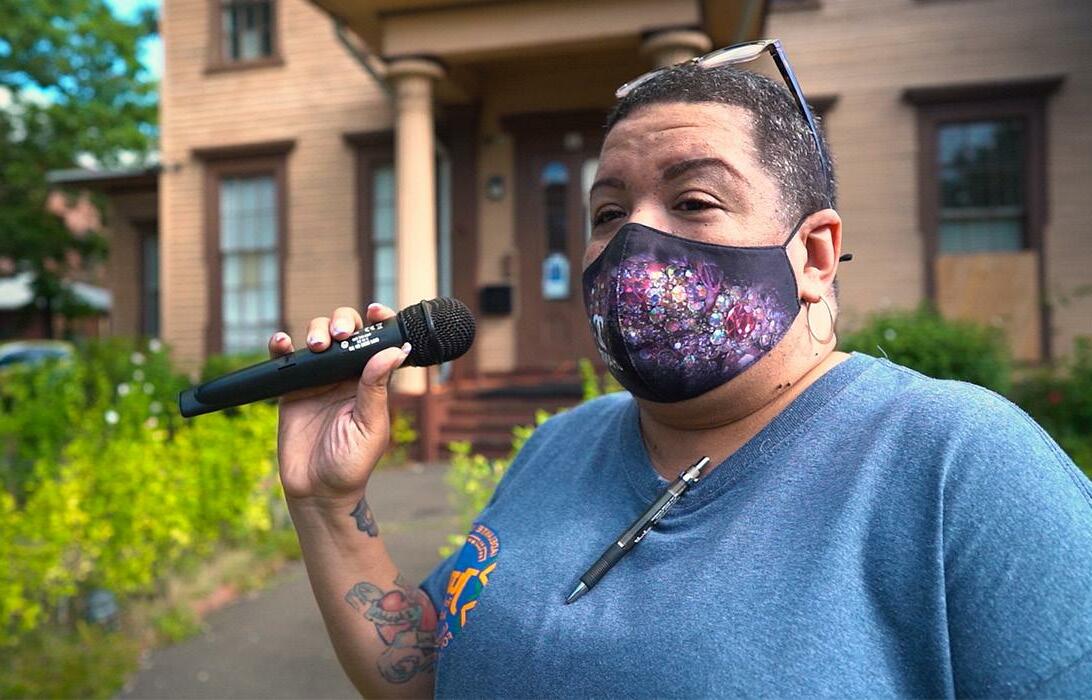
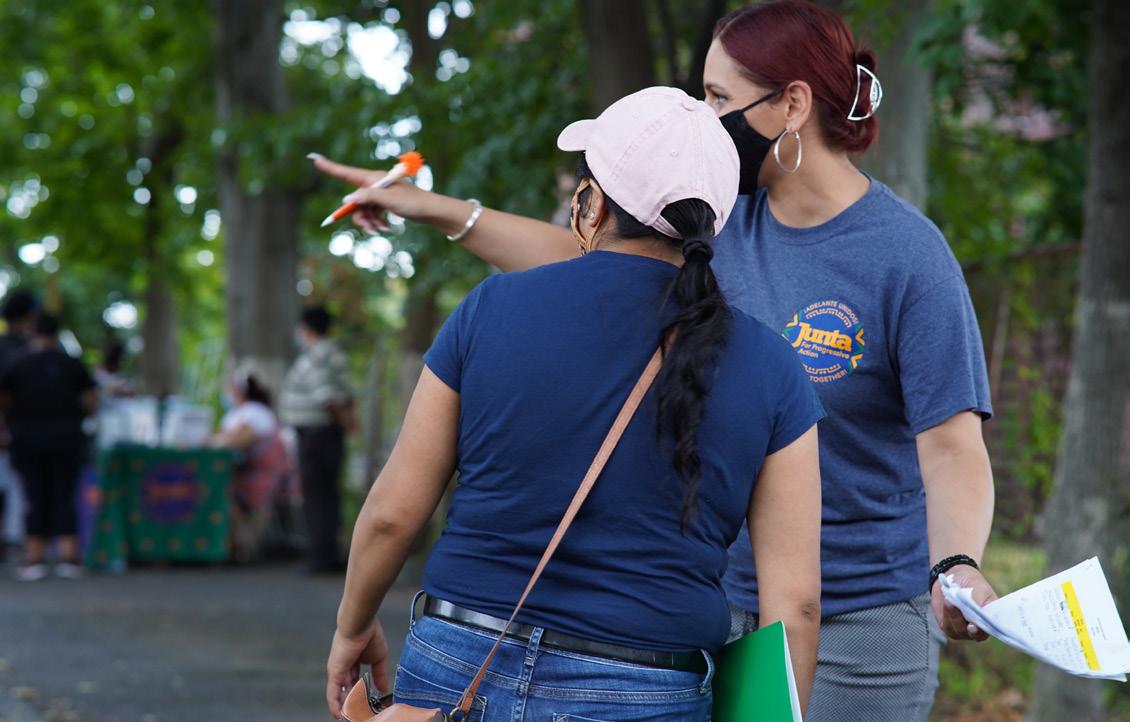
Who We Serve
Junta is located in the culturally robust Fair Haven neighborhood. Our participants come from diverse backgrounds with a large majority hailing from the Caribbean and Latin America. Community members speak Spanish, English or Spanglish in addition to indigenous languages. Many are undocumented, some live in mixed-status households, while others are 3rd generation New Haveners. In the last 5 years, we’ve supported thousands displaced due to climate disaster. Many of our participants reside in towns and cities across Connecticut but most reside in the following Greater New Haven areas: Fair Haven, The Hill, Dwight, West Haven, and East Haven, respectivley.
Adapting to the Pandemic
When the pandemic hit, our community found itself among the first to lose jobs, experience pay cuts, lack access to institutional support, and be frontline workers.
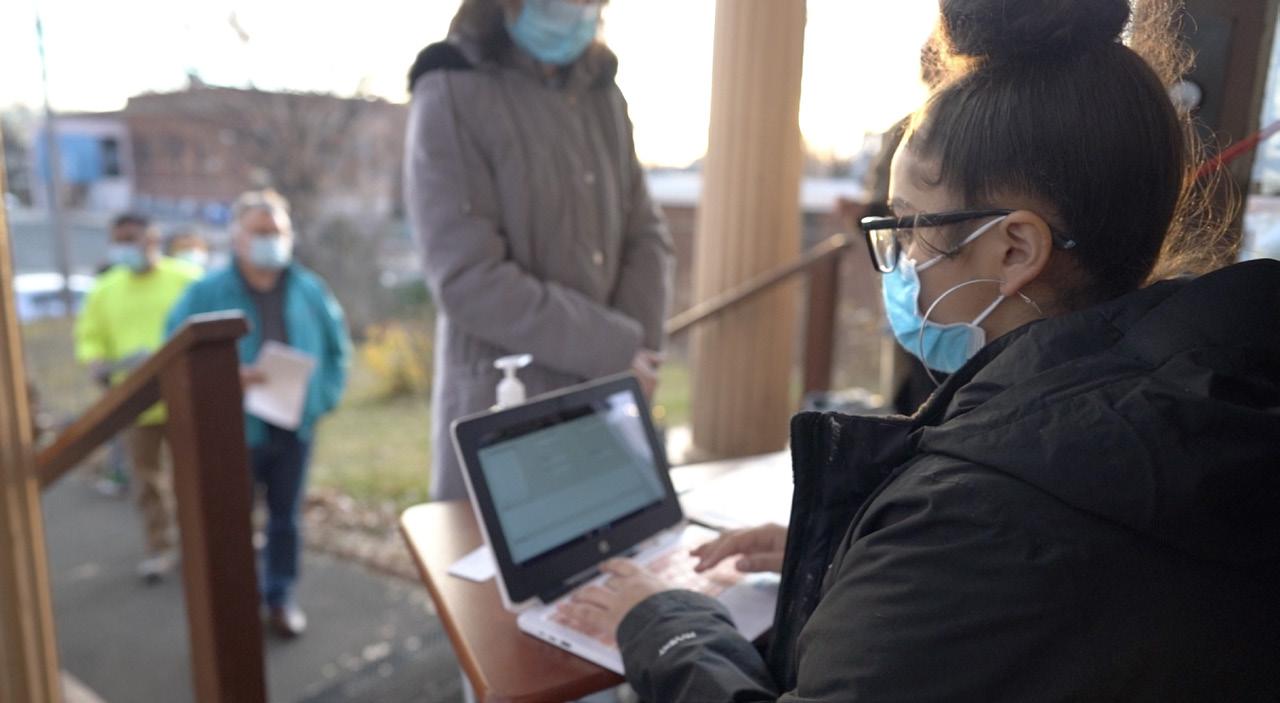
According to DataHaven’s 2019 report on poverty and income in New Haven, 28% of Latinx households are living below the poverty level in New Haven. Latinxs are more likely to have pre-existing conditions that compound Covid-19 infections, to live in multigenerational homes with high-risk family members, and experience the highest rates of mental and emotional health difficulties than any other demographic in New Haven during this pandemic. These statistics are particularly alarming for the many recent migrants we serve because being undocumented restricts the number of available support systems. Junta felt the aftershocks of this socio-economic devastation, both in our crisis response and in our administrative capacity to meet the need.
Our switch to hybrid services — both in-person and telesocial (borrowed from telehealth) — allowed us to continue providing for our community’s needs while ensuring the health of Junta staff. Embracing virtual options was also necessary to sustain our operations as a nonprofit navigating a severe economic downturn. Junta has evolved to the rapidly-changing conditions of our world, merging technology into our service model to better serve our constituents. Our hybrid model has fostered resiliency amidst Covid variants, an economic recession, and heightened community needs. This resiliency has helped us adapt to the rapidly changing socioeconomic landscape and has ensured a lifeline for those in need.
Hybrid and Telesocial Services: Going Digital in the Pandemic

Crisis services foregrounds the work that we do. Following the current public health crisis, Junta had to expedite transitioning its documents, operations, and communications to the digital landscape. Although digital services came with a learning curve, many of our participants have smartphones and quickly adapted with Junta’s support. For those with busy work and childcare schedules, unstable transportation, and whose finances faced soaring gas prices, digital services were a relief. Based on each participants’ needs, we straddle the line between telesocial and in-person services. Cases involving referrals, consultations, inquiries, and some applications for state or Junta-based assistance can easily be completed through zoom, phone, or text. Other cases involving more complicated applications, sensitive situations, and physical programs like our vaccine clinics require in-person intakes.
We also account for the digital divide, making exceptions for seniors, people with disabilities, and income restrictions that affect access to technology. Adapting to this rapidly evolving landscape has allowed us to reach more people with less administrative resources and work more effectively throughout.
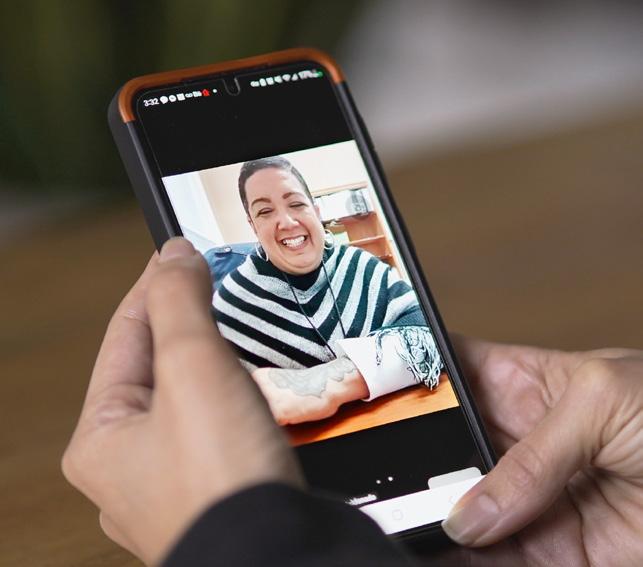
Virtual Townhalls: Cafecito con Junta
Cafecito con Junta was originally launched in August 2020 as a virtual town hall to bridge the information divide and connect with the local, Latinx community using multiple social media platforms. This video series of bilingual coffee chats addresses the lack of culturally-palatable information online associated with the multidimensional impacts of the pandemic. In particular, the local immigrant community continues to be impacted by constantly shifting laws, new health regulations, educational changes, and assistance disruptions. These videos and in-person conversations [since 2022] supplement our outreach and span the topics of Covid-19, housing, education, and finance. We’ve also discussed sensitive content experienced by Latinas during the pandemic, such as sexual and domestic violence. By featuring this resource content, we build community support and a space for trustful dialogue between our participants and the Junta team.
To view a full playlist of videos, use the link below: bit.ly/Cafecito-Con-Junta
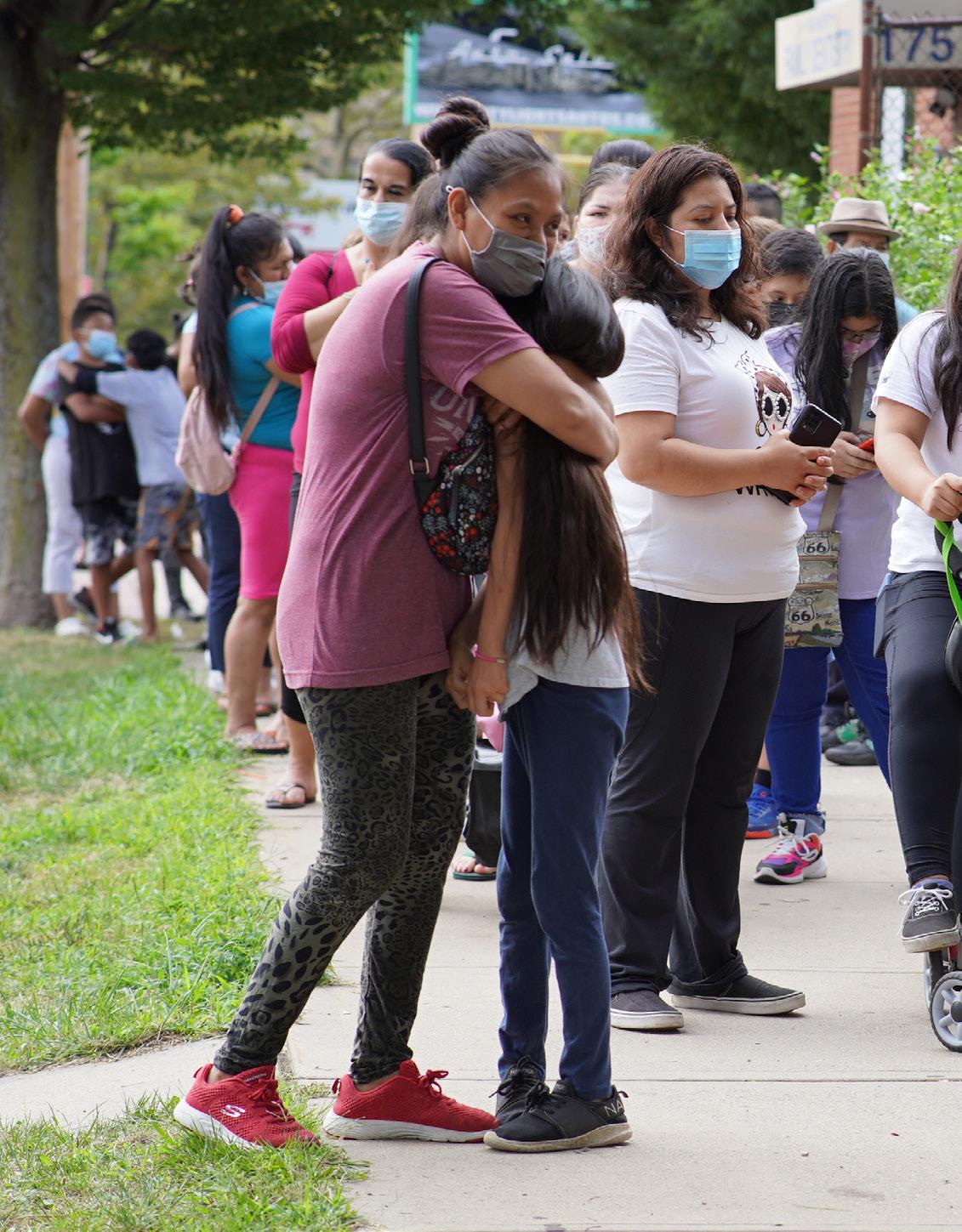
A New Arm of Case Management: Community Health Work
Vaccine Disparities
Public health officials have long established that Covid-19 has disproportionately affected Black and Latinx communities, especially those with a sizable undocumented population. The story with vaccines is no different: since the initial roll out of these lifesaving immunizations, equitable vaccine distribution and credible vaccine health information have been harder to access in these communities. Likewise, the history of unethical medical studies on Black and Latinx people combined with misinformation efforts targeting vaccine safety and efficacy have undermined public trust. Access to health resources and quality of life are essential needs, especially now as we endure the realities of the Covid-19 era. Given the realities of vaccine inequalities and Junta’s role as a trusted messenger in the community, we realized the potential of saving lives through community health initiatives.
Covid-19 Vaccine Outreach
Our close relationships with participants reaffirms Junta’s role as a trusted messenger for vaccine distribution and information. We strive to strengthen our impact as a trusted public health source by providing transparent and accessible information on vaccinations. Through cultural programming efforts that include Cafecito con Junta, crisis services, informational pamphlets, pop-up vaccine clinics, and more, our priority is to familiarize the community with Covid-19 immunization. The public’s trust is vital to community health and Junta’s role is integral in providing culturally relevant and accurate information that is easily accessible and digestible.
Covid-19 Pop-Up Clinics
During the warmer months, Junta hosts weekly pop-up vaccine clinics on its front lawn, creating an invaluable space where community health and mutual aid can thrive. Participants can receive their first, second, or booster dose at these clinics without needing an appointment. From our start in 2021 to now, we have hosted over 40 clinics and have vaccinated more than 600 people. However, our pop-up clinics are not standalone; Junta simultaneously hosts community events to assert that our clinics are not only medical sites but sites representing and celebrating community action, culture, and life. For example, we have collaborated with New Haven Legal Assistance to provide several Tenant's
Rights workshops. We hosted our annual End of Summer Celebration event, where we distributed free school supplies and backpacks. By transforming vaccine clinics into a cultural community space, participants feel more welcomed to ask questions, receive information, and get a vaccine. Our partnerships with New Haven Health Department, Connecticut Department of Health, CornellScott Hill Health Center, and CARE have supported our work in reconceptualizing the conventional vaccine clinic to mitigate the impacts of the pandemic with meaningful cultural programming.
To view a full video playlist of Junta’s Popup Events, use the following link: bit.ly/Junta-Popup-Events
Covid-19 Prevention
Early in the pandemic before vaccines were disseminated, experts and local officials emphasized the importance of testing and masking to prevent community spread. The appearance of the omicron variant in December 2021 unmasked how easily overwhelmed testing services can become and how quickly at-home tests can disappear off the shelves. Since then, Junta has been providing free rapid test kits to participants to ensure the accessibility of Covid-19 testing. Participants also receive safety packets that include free masks, ensuring that families have at least some protection from the virus.
To view a video of our contactless Covid testkit delivery service, use the following link: bit.ly/Covid-Testkit-Delivery
My Vaccination Stories
To assist against vaccine hesitancy, Junta is collecting willing participants’ voices concerning their experiences with receiving the Covid-19 vaccine. These stories reinforce public trust, showing other community members that vaccines are safe, effective, and our best tool against the pandemic. We’ve uploaded these stories to our social media channels and hope to mail them in print to our participants. Knowing a peer, neighbor, or colleague that has received the vaccine can restore confidence in the most hesitant individuals. Cultural relatability that is proximate to the local communities we serve can increase trust and reduce vaccine hesitancy.
To view a full playlist of Junta’s My Vaccination Stories, use the following link: bit.ly/MiVaxStory
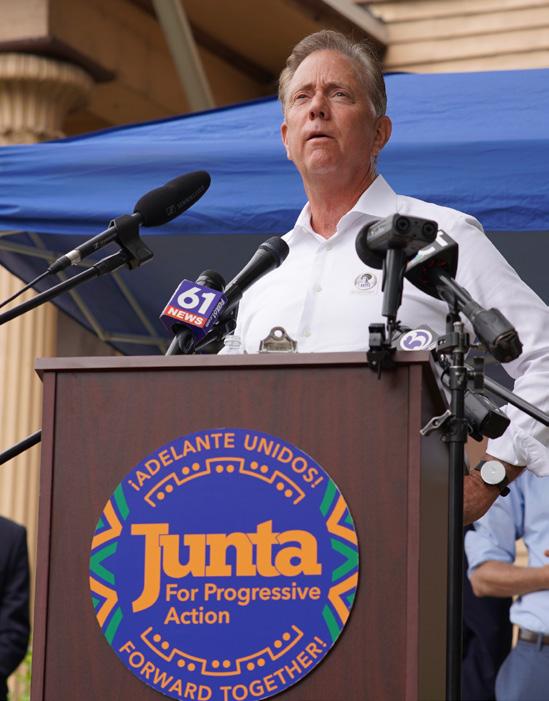
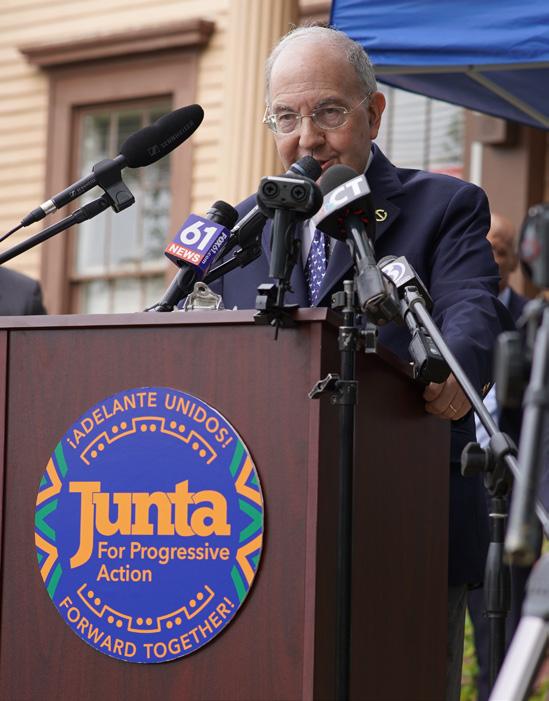
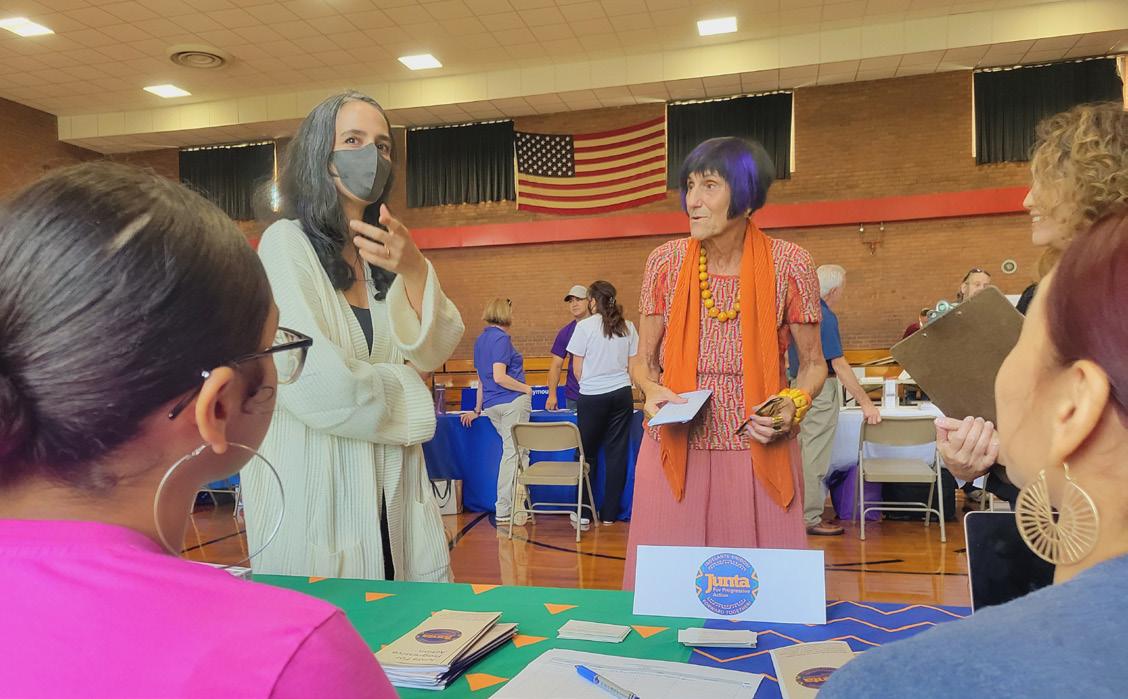
Junta’s team of case managers are more than just social service workers, they are street therapists. Take an intimate look at the impact of Junta's services through the lens of a few of our participants.
STORIES FROM THE FRONTLINES
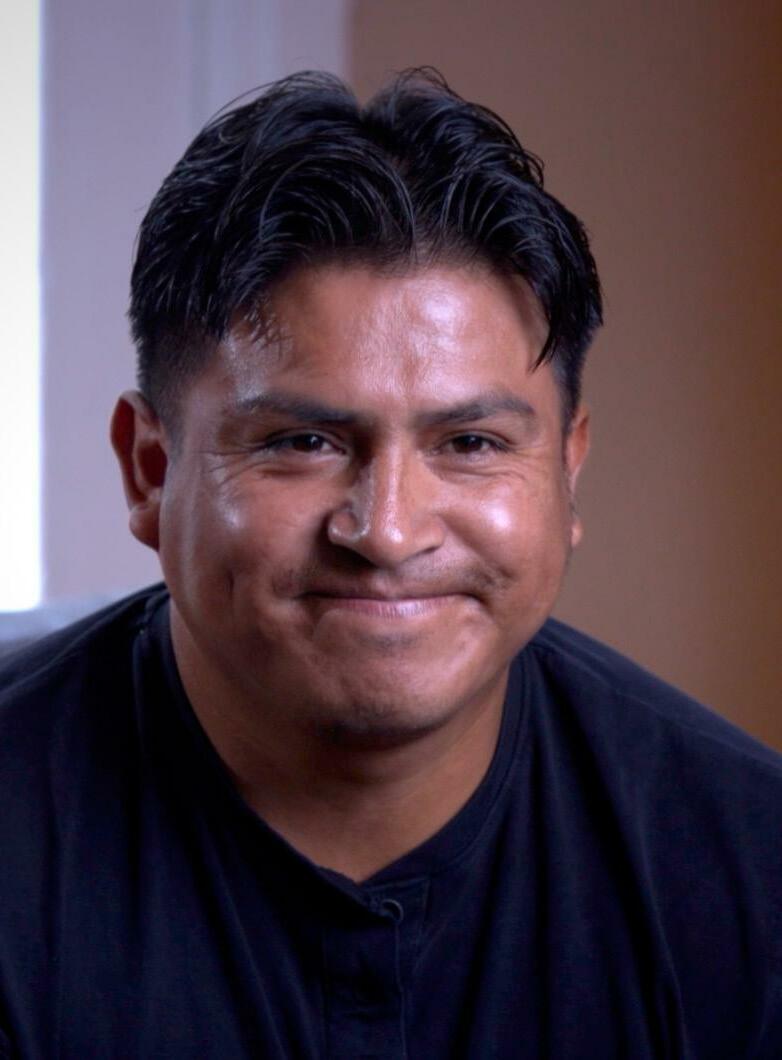 STORIES FROM THE FRONTLINES JUNTA FOR PROGRESSIVE ACTION
STORIES FROM THE FRONTLINES JUNTA FOR PROGRESSIVE ACTION
In 2020, a workplace injury left Hugo disabled with extensive damage to his legs. The missed work days caused him to lose his job, eliminating a critical source of income. Misfortune struck again when he fell ill with a severe case of Covid-19. Hugo’s wife became the household’s primary breadwinner. Her pay was substantially lower than her husband’s and the economic situation in their home quickly became challenging. The family soon faced eviction and food became scarce. These hardships took a profound mental health toll on Hugo and his family. And because of his legal status, he assumed that few support systems existed for him and his family.
Eager to find resolve, Hugo sought support from Junta for assistance with housing. Our team of case managers introduced him to UniteCT — a state-run rental assistance program servicing Connecticut’s housing insecure — and helped him apply and eventually receive rental assistance which halted eviction. He also received utilities assistance through Junta’s Pay Utilities Fund. We connected him with SNAP assistance that helped his family combat food insecurity. Given his injury and increasing transportation costs, Hugo received services from the comfort of his home via Junta’s telesocial services model. He credits Junta for his ability to better navigate life's challenges.
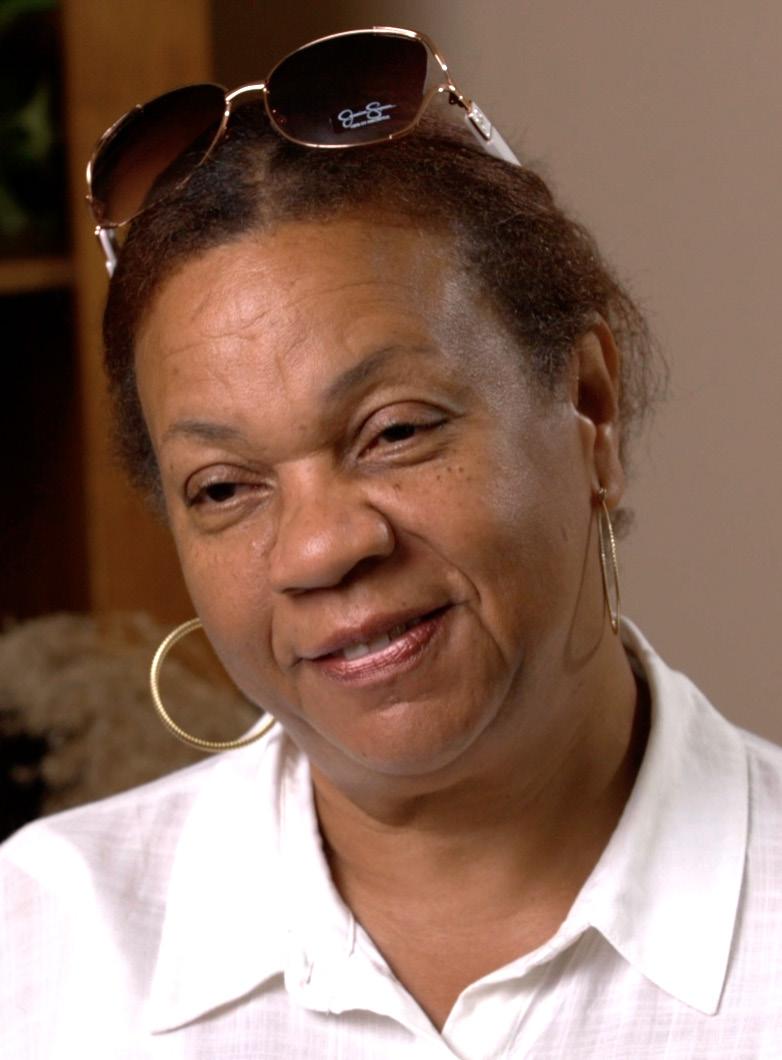 STORIES FROM THE FRONTLINES JUNTA FOR PROGRESSIVE ACTION
STORIES FROM THE FRONTLINES JUNTA FOR PROGRESSIVE ACTION
After receiving a call from her relatives in the Dominican Republic about her mother’s passing, Nurys immediately flew to her home country. When she returned to Connecticut, the reality of her loss overtook her with grief. Nurys plunged into a deep depression that interfered with her daily routines and eventually caused her to lose her job. Having spent an extended period without employment, her financial situation became unstable. Nurys was skeptical of seeking professional help but when her symptoms worsened, she sought medical intervention. Following a few months of treatment, Nurys felt prepared to re-enter the workforce. Although most job applications are online, many older participants struggle to navigate these portals. Junta’s case managers supported Nurys and helped her complete online job applications.
Near the end of 2021, the Omicron surge and Nurys’ mental unwellness made her unwilling to travel places. Nurys often does not have the time nor energy to travel to our office in Fair Haven. Our telesocial services model reduces barriers to access and allows case managers to be a phone call away. As Covid and her mental health have become more manageable, Nurys finds the telesocial option most convenient.
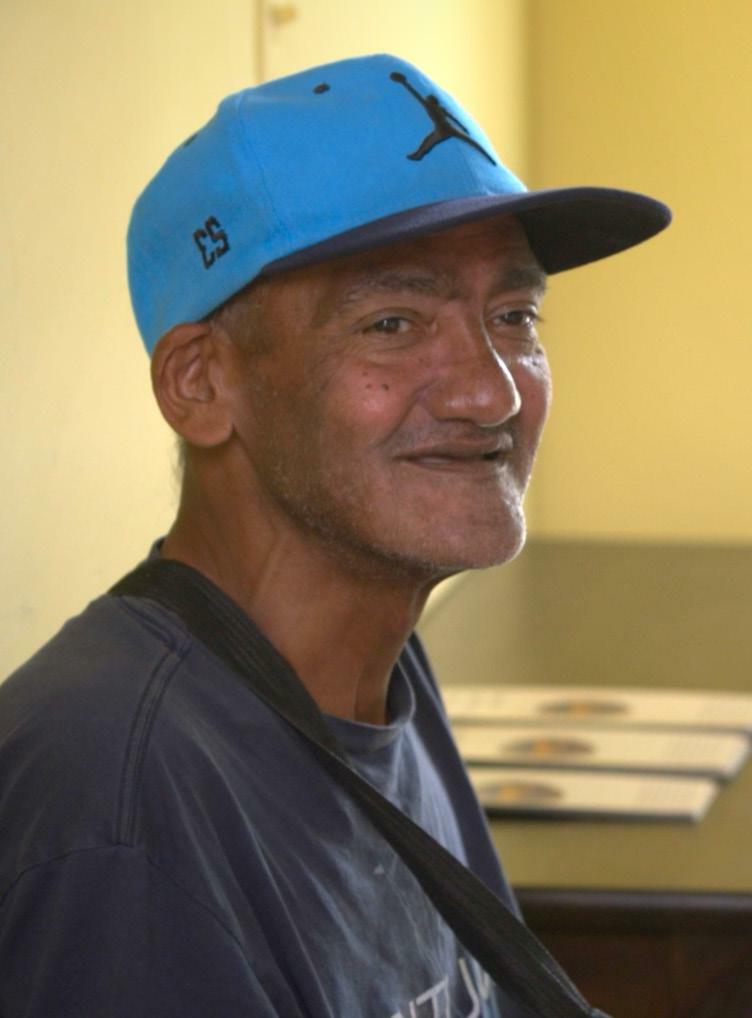
Julio left Puerto Rico and headed to New Haven, CT in search of better living conditions and opportunities. His family remained in the archipelago and he was on his own to navigate a new, foreign environment. His hardships began after he had lost his social security documentation, a necessary requirement to access supplemental security income (SSI). This income is for disabled individuals who face low-resource circumstances and need cash for basic needs. Julio did not have a robust social support system in Connecticut and did not have the means to afford housing.
These circumstances led Julio to fall into the cycles of poverty and homelessness. Life on the streets was an unprecedented circumstance, he did not know anyone, and he experienced frequent hunger and violence. Julio also fell into drug addiction and, at some point, developed HIV. When Julio arrived at Junta, our case managers mobilized to secure his basic needs by applying for housing and food assistance on his behalf. We helped Julio request his personal documentation to restore his benefits and ensure a means of income. As of Fall 2022, Julio no longer lives on the streets and has secured long-term affordable housing.
1. Senator Martin Looney speaks at a 2021 press conference held at Junta.
2. Governor Ned Lamont speaks at a 2021 press conference held at Junta.
3. The Junta team tables at a Community Resource Fair organized by Congresswoman Rosa DeLauro and her team, 2022.
4. One of many families present at Junta's 2nd Annual End of Summer Celebration event, 2022.
5. Junta's Tenant's Rights workshops in partnership with attorneys from New Haven Legal Assistance and advocates from Havenly, 2022.
6. ¡Fiesta Latina! pop-up event held at Junta in partnership with Yale Peabody Museum, 2022.
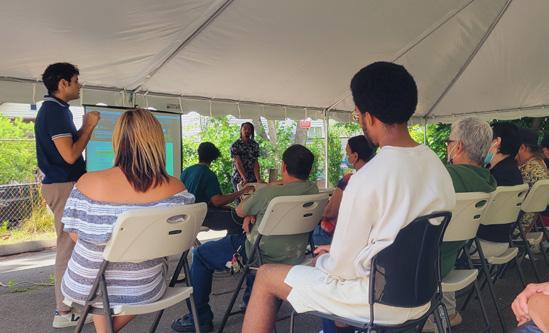
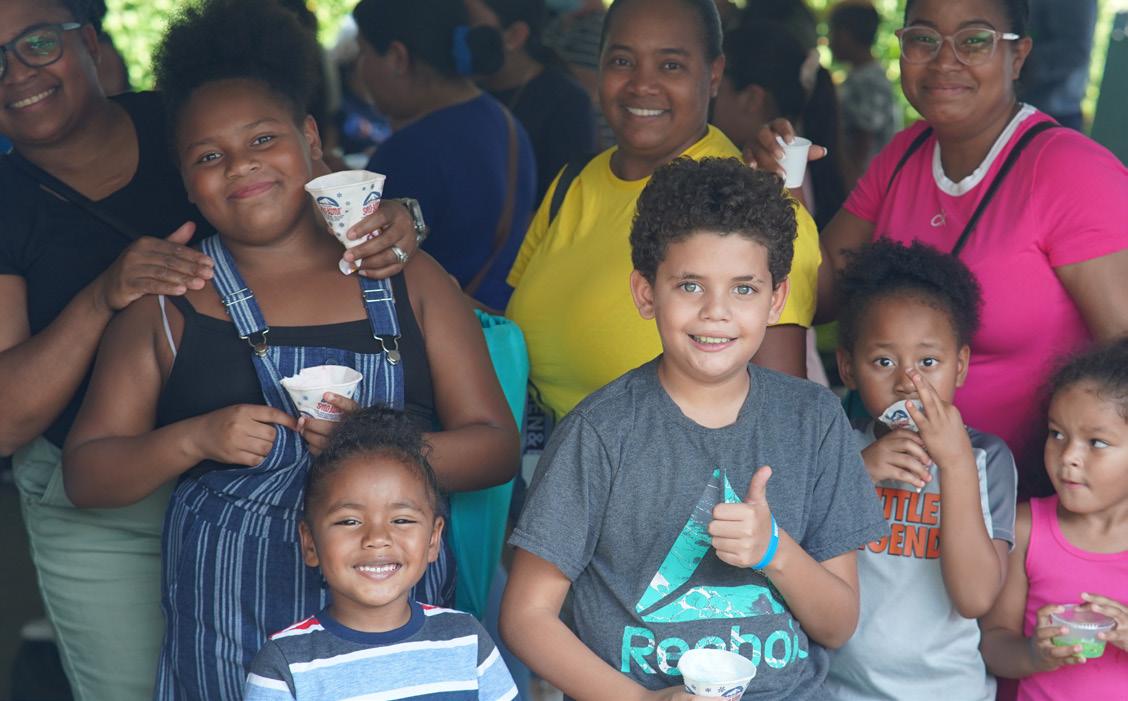

7. Covid-19 Vaccine and Health pop-up event at Junta, 2021.

Crisis Services at a Glance
Government Aid Assistance
Junta’s crisis services team offers bilingual and culturally-sensitive services to help participants’ obtain government aid by guiding them through various state and municipal application processes. For many participants, limited English, bureaucratic jargon, illiteracy, and the digital divide hinder their capacity to find and apply for aid. Likewise, families living in mixed status households often assume most benefits are unavailable to them or their kin, which is a misconception. The guided application support also functions as an instructional moment for participants to familiarize themselves with application processes. We provide access to the following resources:
• Social Security Disability (SSD)
• Social Security Supplemental Income (SSI)
• Public Assistance
• Cash assistance (TANF/SAGA, Child Support)
• SNAP
• HUSKY / Medicaid health insurance
• Public Housing (Section 8, HUD, and other Public Housing programs)
• Child Care Assistance (CARE4KIDS)
Direct Cash Aid Card Program
Junta for Progressive Action receives monetary donations and funding to support participants that need emergency financial assistance.
• Department of Social Services (DSS) funding for emergency food cards (Walmart, Stop & Shop, and C-Town cards)
• 4-CT Direct Cash Card (cash card with the option to withdraw cash or make direct payments for food, utilities, or other basic needs)
• New Haven Health Department (vaccine incentives)
Direct cash cards range from $25 - $400. To date, we have raised $36,000 in direct cash funding and distributed 425 cards, reaching over 1,200 individuals with demonstrated need.
Diaper Distribution
The pandemic made it difficult for low-income families to obtain and afford diapers. As such, Junta launched a bi-monthly Diaper Pick-Up service to meet the need. Since 2020, Junta distributed over 17,000 diapers to hundreds of households. Today, Junta continues as a member of The Diaper Bank, distributing diapers to lowincome families in the Greater New Haven area.
Employment
The pandemic continues to cause devastating job loss. For many, job loss equates to a loss of income. Our participants have dealt with historic oppression and disenfranchisement, including cumulative burdens of poverty, structural racism, and inaccessibility to critical resources. Unemployment serves to compound these poor outcomes. Junta’s employment and crisis specialists are readily available by phone or appointment to assist community members. We provide resume-building services, job and volunteer opportunities, and material support (food, rent, utilities).
Referrals
For over 50 years, Junta has established strong partnerships with organizations, mutual aid, and other critical institutions to offer more holistic services to the community. For any service that Junta for Progressive Action cannot provide, we redirect community members to partner organizations or government agencies specialized in a respective service. We offer participants various pathways to access resources so that they feel supported and equipped to overcome crises.
Disaster Resettlement
Climate-induced disaster represents one of the major crises of our time. Following Hurricanes Maria and Irma in 2017 and the earthquakes of 2019-2020, thousands of Puerto Ricans sought refuge in New Haven. Since 2017, Junta has provided ongoing disaster resettlement services to over 2,000 individuals. These services include support with SNAP and health insurance applications; immediate medical referral to clinics or hospitals; housing application assistance; school registration and ESL classes.
The following sections highlight Junta’s programing and services in more detail:
The devastation in Puerto Rico will continue to persist in the Caribbean and Latin America. New Haven will remain a popular destination site for those displaced by climate change. As the longest-standing Latinx social services organization in Greater New Haven, Junta is well positioned to continue to be frontline in recovery, resettlement and climate adaptation efforts.

The latent impacts of the pandemic have had significant negative outcomes for those uprooted by disaster. Climate migrants are experiencing a protracted resettlement period as they continue to struggle with endless waitlists, loss of income and further displacement from rising rents. The Junta team works with resettled individuals and families to promote access to essential services and overcome multiple crises.
The Pay Rent Fund (Rent Assistance Program)

In response to the burgeoning eviction crisis, Junta launched the Pay Rent Fund in April 2020. Although the eviction moratorium protected tenants from rent costs during the pandemic, many people remained with months of back rent debt after its expiration. The public health crisis has intensified the demand for affordable housing, while exhorbitant rent hikes continue to place stressors on households. The Pay Rent Fund is woven into Junta's existing wraparound services and addresses urgent needs for housing stability in an increasingly expensive city.
The Pay Utilities Fund (Utilities Assistance Program)
Junta launched the Pay Utilities Fund to provide additional household support. By providing $100 towards a utility bill, this Fund helps relieve household energy burdens. The Junta team also informs participants about utility payment plans and programs available to low-income families.
Social Services Highlights
During 2020-22, Junta provided approximately 16,000 services that impacted over 5,000 community members, annually.
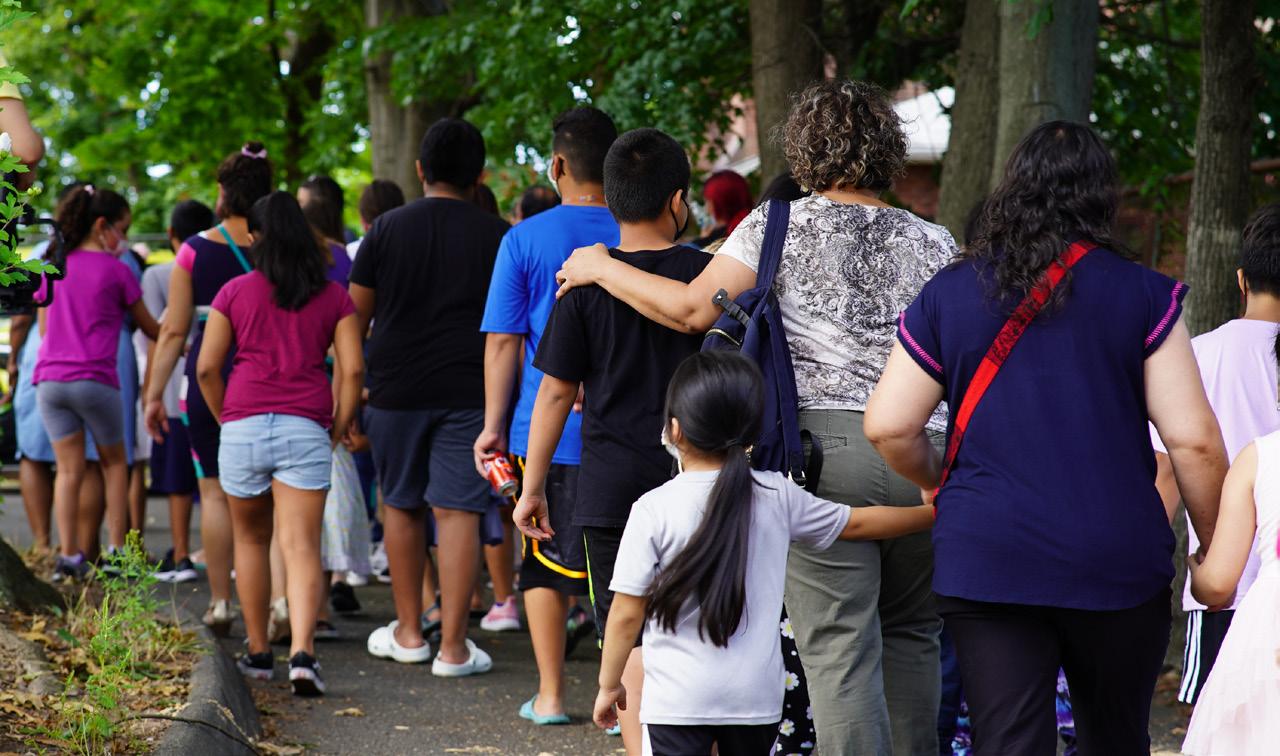
For over 50 years, Junta has invested in the advancement of Latinxs across Greater New Haven and beyond. The cultural humility ethos that guides our organization facilitates nuanced dialogue and a deeper understanding of the cumulative issues impacting the Latinx community. By supporting our participants in navigating predominantly English-dominant, complex bureaucratic systems, our case management team serves as an
advocate for families in need. Beyond such direct assistance, Junta serves as an information hub for the Latinx community, endowing participants with an intimate understanding of the landscape to which they are adjusting. Our team uniquely equips participants with access to bilingual and culturallyrelevant programing and services that advance participants’ professional and leadership capacity.
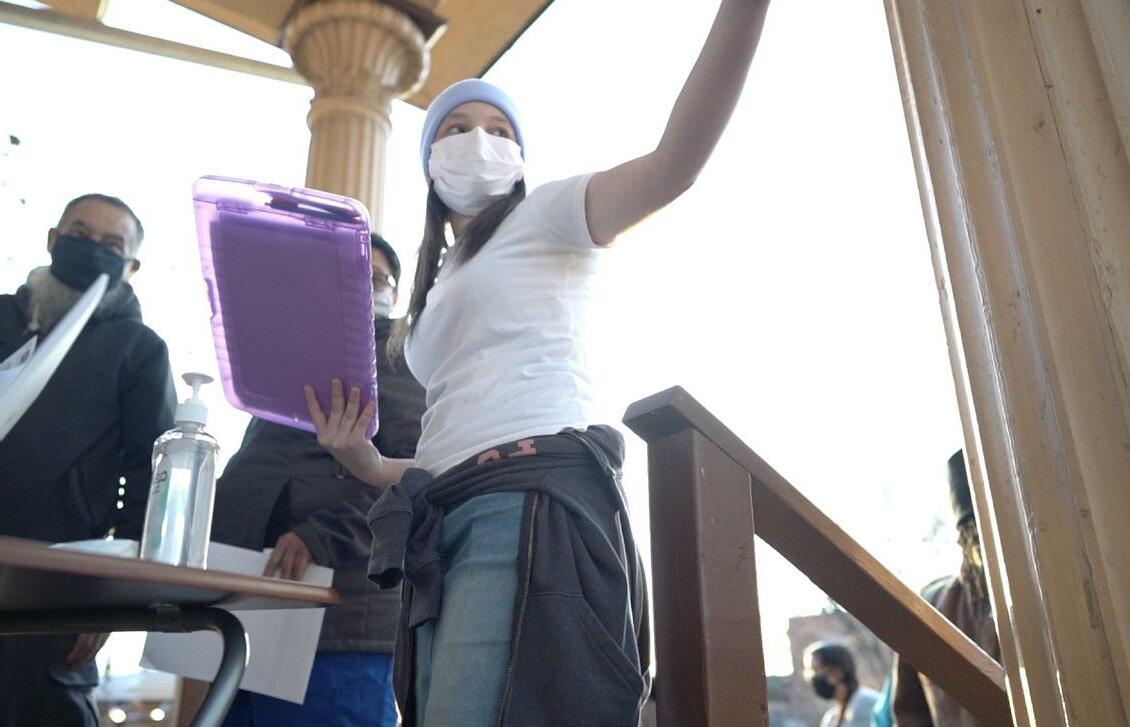
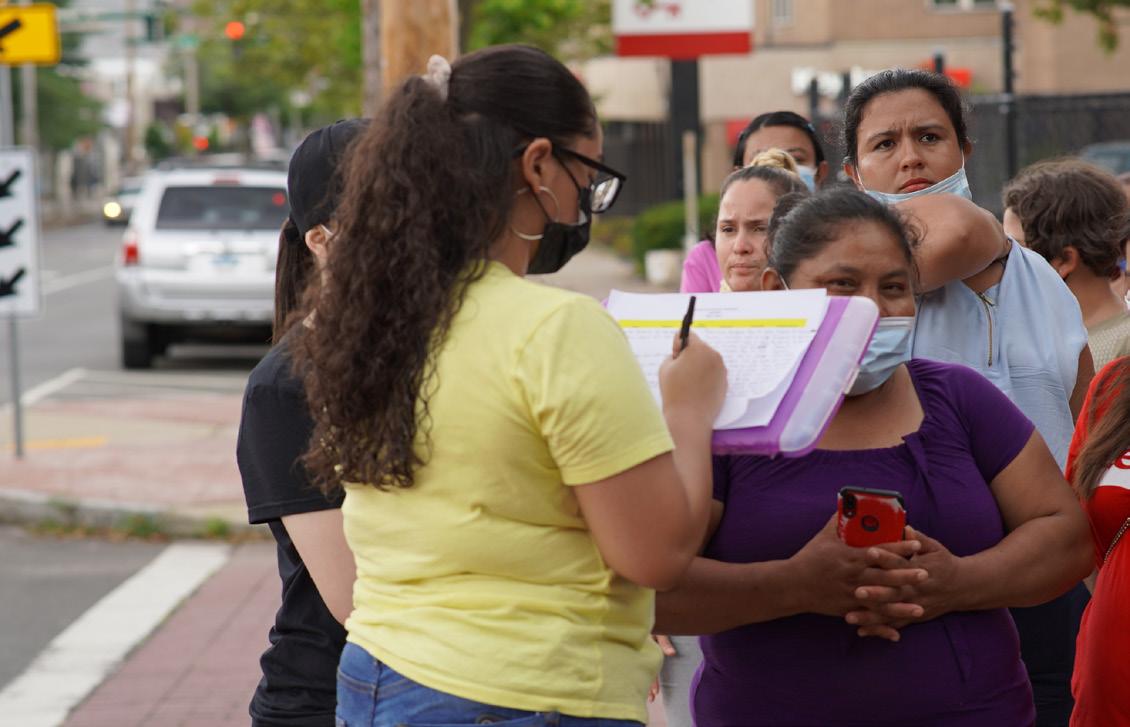
Cultivating Future Leaders: Youth Empowerment Programs
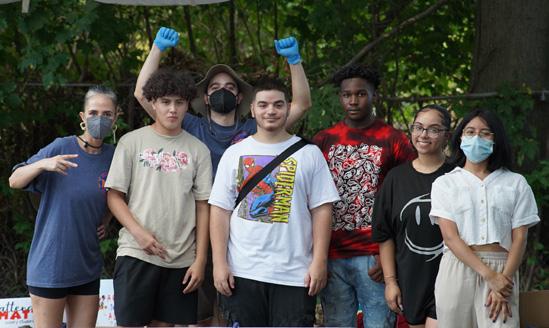
Youth Apprenticeship Program
The Covid-19 era has been a period of intense social isolation at a time when interpersonal interactions are vital to teenage development. Junta continues to attract young talent from nearby high schools and provides an outlet to learn, socialize and spearhead programming. At least 20 youth apprentices have contributed their time and energy to support the provision of social services at Junta. These young leaders form deep bonds with the organization, its staff, and community members while gaining a critical awareness of the issues impacting their community. Given this knowledge, several of the apprentices have embarked on co-designing successful Covid-19 outreach campaigns with high community turnout. Some have gone on to join the Junta team as salaried employees. Junta’s Youth Apprenticeship Program serves as a pipeline to imbue youth with the professional skills necessary to prepare for careers in social services and humanitarian work.
Youth Entrepreneurship Summer Program
Junta firmly believes in building selfdetermination in our community. The Youth Entrepreneurship Summer Program initiative is centered on developing talent and entrepreneurship among high school students. Students engage in an 8-week curriculum covering financial literacy, business, marketing, and shark-tank style idea pitching. By learning professional and leadership skills, youth explore non-traditional career pathways.
Camp Folklorico
Ballet Folklórico, or Mexican folk dancing, is a popular cultural artform that encapsulates the rich traditions and dance practices of Afro-Caribbean, Indigenous, and Mestizo (Mixed) communities from Mexico. With the knowledge and expertise of Ballet Folklórico Mexicano de Yale, Yale’s only Mexican undergraduate dance ensemble, the youth engaged in a four-week summer camp. This program aimed to familiarize students with the fundamentals of folkloric dance and learn the choreography of one of two regional dances (Sinaloa and Guerrero). Through these cultural lessons, students experienced firsthand how Ballet Folklórico has been used in communities in the United States and Mexico for social uplift, healing, and as a displayer of ethnic/ cultural pride. Camp Folklórico also provided a vital space for youth who face marginalization because of language development, academic under-performance, socioeconomic status, or identity.
Future Directions
Junta for Progressive Action is future-oriented as we continue to foster social innovation for highest impact. While we still believe in providing direct aid and crisis relief, we also consider creative ways in which we can adapt to the rapidly changing socioeconomic landscape. Development can mean many things: strengthening our services, implementation of new programs, digitizing our processes, expanding our reach to surrounding neighborhoods, and much more. The following are future directions we look forward to exploring:

In-person Town Halls
Engaging in meaningful conversations with community members is critical to co-designing future programming. In 2023, we plan on continuing to engage community members through in-person town halls where residents, local leaders and organizations can discuss the issues that matter most to community members. Town halls can also provide spaces for problem-solving, where people can engineer culturally relevant solutions to widespread crises. For those impacted by the digital divide (i.e. the elderly), town halls can facilitate participation by providing an in-person medium for individuals to ask questions and voice their concerns.
Expanding Youth Apprenticeship
Expanding Junta’s Youth Apprenticeship Program would increase opportunities for youth to engage professionally with a historic, Latinx multiservice agency like Junta. Expanding the program would strengthen our capacity to support youth in developing professional skills in program management, fundraising and outreach. By integrating young community members into our organization, Junta helps build the next generation of community leaders and social service workers.
Community Health Worker
Covid-19 compounded socio-economic hardships and loss, resulting in a significant demand for mental health services. Despite the pandemic and economic downturn that has impacted Black and Latinx folks the most, mental health services are the least accessible to these communities and are often not culturally responsive. Black and Latinx individuals are also most likely to suffer from substance abuse and terminate treatment before completion.
In partnership with the Connecticut Mental Health Center (CMHC), we are excited at the prospect of hiring a community health worker to join the Junta team. The Community Health Worker will liaise with our staff and CMHC to increase access to critical mental health support. Our community contends with precarious living situations and dire material needs: back rent debt, eviction, hunger, homelessness, and more. We look forward to providing an outlet for participants to confidentially discuss their circumstances and access professional care in a trusted environment.
Bridging the Digital Divide
The digital divide is one of the many barriers our communities face and we intend to increase digital literacy to keep participants informed about Junta's happenings and essential services. Communicating with participants helps us inform community members about changes to Junta operations, events, and facilitates telesocial services. Junta looks forward to expanding our digital process to reach more community members.
Strategic Partnerships
Strengthening partnerships with other community-based/ direct aid organizations and government agencies is integral to the work we do. Joint events like our housing and vaccine pop-up events provide nuanced service delivery and empowers participants to take charge of their health and housing needs. Referring participants to specialized service providers ensures everyone receives the help they need. Junta aims to maintain and reinforce these partnerships, which are essential to our work.
Capital Campaign
The Junta house was built in 1850 and is long overdue for repairs. One of our goals is to embark on a capital campaign to renovate the Junta house and make it better suited for our day-to-day operations. These improvements would require modifying the house for better ventilation against Covid and other airborne illnesses, making structural upgrades, and providing larger spaces to accommodate the increased volume of participants.
Meet the dedicated Junta Team
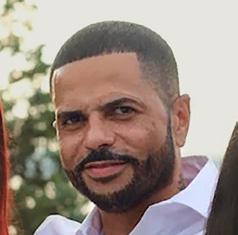
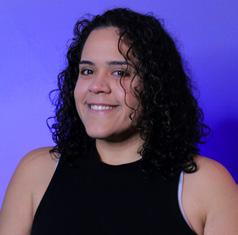





 Rafael Ramos Board Chair
Fred De Pourcq Treasurer Sylvia Perez Secretary
Board of Directors
Alphonse Paolillo
Brian Pierne Peggy Rivage-Seul Elihu Rubin
Cheila Serrano Director of Social Services
Jacqueline Gonzalez
Kiana Cintron Bilingual Program Assistant
Rosaida Maldonado Case Manager
Bruni Pizarro Executive Director
Loribeth Rodriguez Bookkeeper
Rafael Ramos Board Chair
Fred De Pourcq Treasurer Sylvia Perez Secretary
Board of Directors
Alphonse Paolillo
Brian Pierne Peggy Rivage-Seul Elihu Rubin
Cheila Serrano Director of Social Services
Jacqueline Gonzalez
Kiana Cintron Bilingual Program Assistant
Rosaida Maldonado Case Manager
Bruni Pizarro Executive Director
Loribeth Rodriguez Bookkeeper
Acknowledgements
FUNDERS
4-CT
A Fund in Memory of Owen Osborne Affinity Foundation
Anne Calabresi
Buckeye Partners City Missionary Association
City of New Haven
Community Foundation for Greater New Haven
CT Health Foundation
Dimeo Construction Company Edward F. Cleary
ERJ Fund
Ethel & Abe Lapides Foundation
PARTNERS
A Better Life
Arte, Inc. Bank of America
Bregamos Community Theater
Central CT Democratic Socialists of America & CT
City of New Haven Department, Dept. of Cultural Affairs
City of New Haven, Office of Emergency Management & Homeland Security
Collab New Haven
Community Action Agency
Community Alliance for Research & Engagement (CARE)
Connecticut Department of Public Health (DPH)
Connecticut Fair Housing Center
Connecticut Women’s Education and Legal Fund (CWEALF)
Cornell Scott-Hill Health Center
CT Students for a Dream Daniel Pizarro Studio (www.danielpizarro.studio)
Elm City Communities, Housing Authority of New Haven
Fair Haven Community Health Center
Fair Haven Library
Fair Rent Commission
Greater New Haven Chamber of Commerce
Griffin Health
HAVEN Free Clinic
Havenly
Integrated Refugee & Immigrant Services (IRIS)
Literacy Volunteers
New Haven Health Department
New Haven Legal Assistance Association
New Haven Pride Center
New Haven Promise
New Haven Public Schools, Dropout Prevention
New Haven Public Schools, Office of Adult & Continuing Education
Hispanic Federation
Lewis G. Schaeneman Foundation
National Arts Strategies, Inc New Alliance
New Haven Health Department New Haven Public Schools NuCO2 Supply Office of Minority Health United Way of Greater New Haven William Graustein Yale Center for Clinical Investigation Yale University
New Haven Public Schools, Office of Youth, Family & Community
New Reach
Pro Bono Partners
Puerto Ricans United, Inc. Save the Sound SCSU - Internships
Sisters in Diaspora Collective
The Connecticut Project
The Diaper Bank
The Pride Center
The Semilla Collective of New Haven Yale Architecture
Yale Center for Clinical Investigation (YCCI)
Yale Child Advocacy Center
Yale Ciencia Initiative
Yale FOCUS group
Yale Latino Networking Group
Yale Peabody Museum
Yale School of Law, Community & Economic Development Clinic
Yale School of Law, Environmental Protection Clinic
Yale School of Management, Social Impact Consulting Club
Yale School of Medicine, Community Healthcare Van Yale School of Public Health, Office of Public Health Practice
Yale School of the Environment
Yale University, Despierta Boricua Yale University, Ethnicity, Race & Migration
Yale University, Office of New Haven Affairs Yale University, The Consultation Center
VOLUNTEERS DONATE
Thank you to the tireless commitment of Junta volunteers for their continued support of our organization. Volunteers are a vital part of our ecosystem that helps sustain our work. If interested in volunteer opportunites at Junta, please contact us at info@juntainc.org.
To support our work at Junta for Progressive Action, please consider making a charitable donation using the link below:
bit.ly/Junta-Donate
